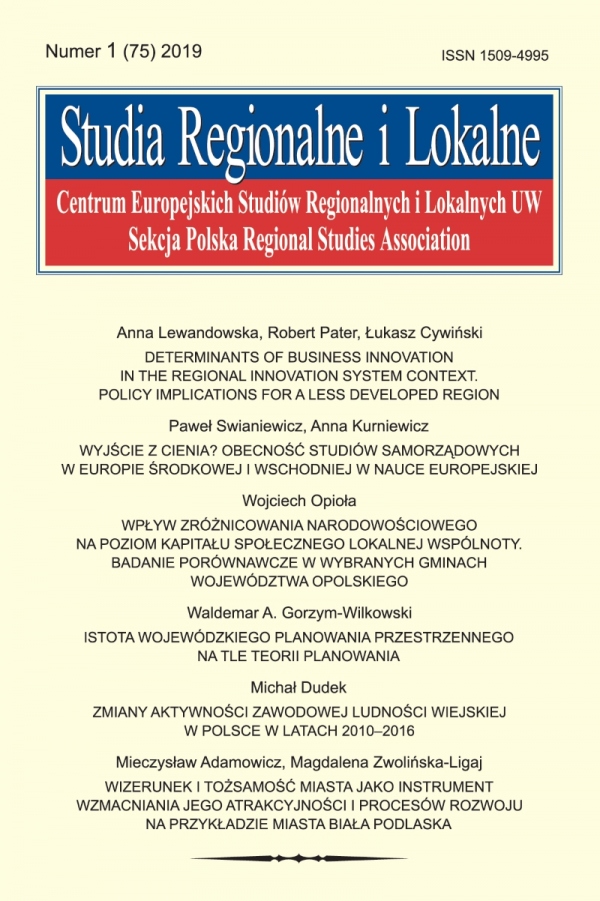Issue:
1(75)/2019
Paweł Swianiewicz, Anna Kurniewicz
Stepping out of the shadow? Studies of local governments in Central and Eastern Europe in European academic research
DOI: 10.7366/1509499517502
Wyjście z cienia? Obecność studiów samorządowych w Europie Środkowej i Wschodniej w nauce europejskiej
Aktualizacja z dn. 2.03.2021: Fragmenty niniejszego artykułu zostały wykorzystane w późniejszej publikacji: Pawel Swianiewicz & Anna Kurniewicz (2018): Coming out of the shadow? Studies of local governments in Central and Eastern Europe in European academic research, Local Government Studies, DOI: 10.1080/03003930.2018.1548352
Artykuł jest analizą zmian pozycji studiów nad samorządami lokalnymi w Europie Środkowo-Wschodniej w głównych nurtach nauki europejskiej. Autorzy odwołują się do teorii rozwoju zależnego (Wallerstein, Prebish) zastosowanej do nauki, traktując Europę Środkowo--Wschodnią jako region półperyferyjny. Analiza empiryczna składa się z dwóch części. Pierwsza, o charakterze jakościowym, to przegląd najważniejszych badań porównawczych samorządów europejskich w ostatnim ćwierćwieczu wraz z określeniem miejsca Europy Środkowo-Wschodniej i badaczy z tego regionu. Druga – ilościowa – oparta jest na analizie artykułów publikowanych w renomowanych międzynarodowych czasopismach oraz ich cytowań notowanych w bazie Scopus. Wśród autorów opracowań poświęconych samorządom w Europie Środkowo-Wschodniej wyróżnieni zostali autorzy lokalni oraz „kolonizatorzy” – badacze pracujący w uniwersytetach krajów Europy Zachodniej i Ameryki. Analiza obejmuje 14 krajów Europy Środkowej i Wschodniej (wszystkie nowe kraje członkowskie UE oraz kraje bałkańskie – Albanię, Macedonię i Serbię).
Stepping out of the shadow? Studies of local governments in Central and Eastern Europe in European academic research
Uptade from 2.03.2021: Parts of this article were subsequently used in the following publication: Pawel Swianiewicz & Anna Kurniewicz (2018): Coming out of the shadow? Studies of local governments in Central and Eastern Europe in European academic research, Local Government Studies, DOI: 10.1080/03003930.2018.1548352
The article is an analysis of the changing role and position of research on local governments in Central and Eastern Europe in the mainstream European studies. The article refers to dependency theory (Wallerstein, Prebish) applied to scientific research. It classifies Central and Eastern Europe as a half-periphery of academic research. Empirical analysis consists of two parts. The first – qualitative – is a review of the most important comparative studies of European local governments and includes discussion of the role of local governments and researchers from the Eastern part of the continent in those studies. The second – quantitative – is based on an analysis of articles published in the best international journals and citations of those articles in the Scopus database. The authors of articles on local governments in Central and Eastern Europe are divided into two groups: “locals” and “colonisers” – i.e. academics from Western universities conducting their research in Eastern Europe. The analysis covers 14 countries of Central and Eastern Europe (all the New Member States that have joined the EU since 2004 plus the Balkan countries – Albania, Macedonia and Serbia).
Affiliation:
Paweł Swianiewicz: Uniwersytet Warszawski, Wydział Geografii i Studiów Regionalnych, Zakład Rozwoju i Polityki Lokalnej, ul. Krakowskie Przedmieście 30, 00-927 Warszawa;
pswian@uw.edu.pl Anna Kurniewicz: Uniwersytet Warszawski, Wydział Geografii i Studiów Regionalnych, Zakład Rozwoju i Polityki Lokalnej, ul. Krakowskie Przedmieście 30, 00-927 Warszawa;
annakurniewicz@uw.edu.pl 


